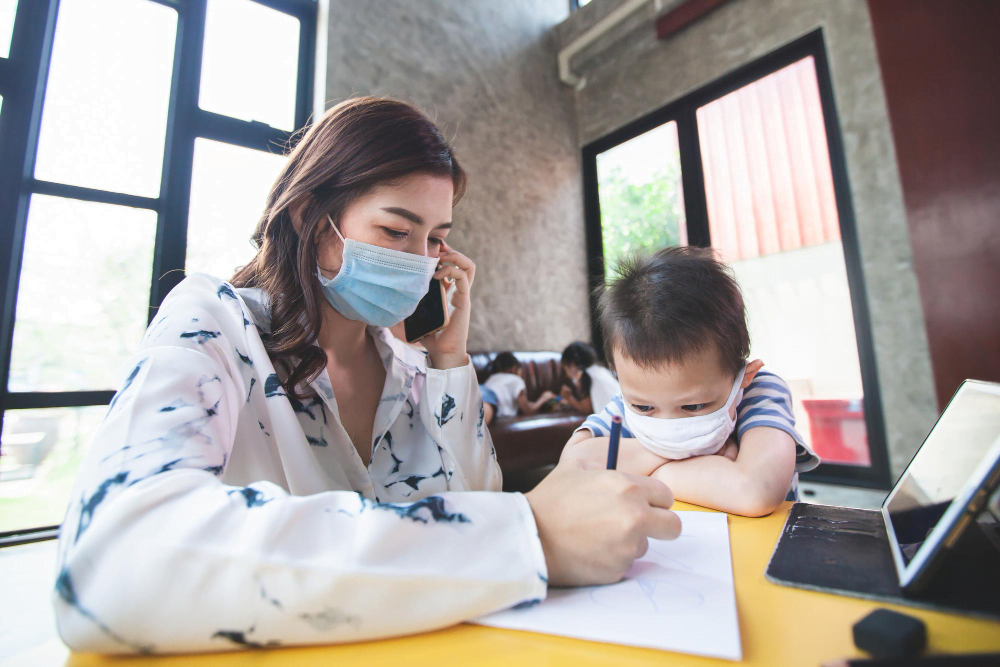Fever in children can be a daunting experience for parents, often filled with concern about when to seek medical advice. This guide is designed to demystify the process, providing clear, straightforward information to help you understand how to effectively monitor and manage your child’s fever.
We’ll cover what constitutes a normal body temperature, how to accurately measure a fever, and crucially, when it’s time to call the pediatrician. Our goal is to empower you with the knowledge needed to make informed decisions about your child’s health. By the end of this guide, you’ll feel more confident about recognizing the signs that necessitate a call to the pediatrician, ensuring your child receives the best care possible without unnecessary stress.
Understanding Fever in Children

What Is Normal Body Temperature?
Normal body temperature for a healthy child ranges from 97°F (36.1°C) to 100.4°F (38°C). Variations within this range can be influenced by the time of day, recent activities, or how the temperature is measured. Understanding what constitutes a ‘normal’ temperature is essential in assessing your child’s health. According to the American Academy of Pediatrics, this range is considered normal for children. For more detailed information, you can refer to their guidelines here.
How to Accurately Measure Your Child’s Fever
Rectal Temperature: The Gold Standard
For the most accurate measurement of a child’s fever, especially in infants and children under three years old, rectal temperature remains the gold standard. Ensure the thermometer is properly sanitized and gently insert it into the child’s rectum for a reliable reading.
Alternatives to Rectal Thermometers
For older children, or when a rectal temperature is not possible, oral, ear (tympanic), and forehead (temporal artery) thermometers are viable alternatives. Each method has its specific procedure, so following the manufacturer’s instructions for accurate results is crucial.
When to Call the Pediatrician for Fever

When faced with your child’s fever, knowing when to seek medical advice is crucial. The guidance below is designed to help you make this decision with confidence.
Immediate Concerns: Signs That Can’t Wait
Certain symptoms accompanying a fever necessitate immediate medical attention:
- For infants under 3 months, any fever (rectal temperature 100.4°F or higher) is a call to the pediatrician.
- Persistent crying or irritability.
- Difficulty waking up or interacting.
- Rash or purple spots that look like bruises on the skin (could indicate a serious bacterial infection).
- Signs of dehydration, such as no wet diapers for 8-12 hours, dry mouth, or crying without tears.
Fever in Newborns and Infants: A Special Case
Newborns and infants have immature immune systems, making them more vulnerable to infections. If your baby is under 3 months old and has a fever, it’s important to contact your pediatrician immediately.
Evaluating the Severity of Your Child’s Fever
When assessing the severity of a fever, consider both the temperature reading and how your child appears to be feeling:
- A high fever (above 104°F) merits a call to the pediatrician, regardless of your child’s age.
- If the fever is lower but your child appears very unwell, lethargic, or is experiencing other concerning symptoms, seek medical advice.
What Fever Is Too High for Pediatrics?
A fever reaching 104°F or higher is concerning at any child’s age and requires evaluation by a health professional. Remember, fevers are the body’s way of fighting infection, but when excessively high, they can indicate a more serious condition.
The guidelines provided aim to reassure parents about when a pediatrician’s advice is needed, ensuring your child receives the right care at the right time.
Other Symptoms to Watch For

In addition to monitoring your child’s fever, other symptoms can indicate the need for medical attention. These symptoms, when appearing alongside a fever, may suggest a more serious condition that requires a pediatric assessment.
When a Fever Isn’t the Only Concern
Be vigilant for symptoms such as:
- Difficulty breathing, which could indicate respiratory issues.
- Severe headaches or a stiff neck, signs that could suggest meningitis, especially if accompanied by a fever.
- Unusual behavior, like extreme irritability or lethargy.
- Persistent vomiting or diarrhea, leading to dehydration risk.
- Severe abdominal pain, which could signal appendicitis or another serious condition.
Accompanying Symptoms That Require Immediate Attention
Some symptoms in combination with a fever are more alarming and warrant immediate medical attention:
- A fever following exposure to extreme heat could indicate heatstroke, a medical emergency.
- A fever with a severe headache, stiff neck, and vomiting could suggest meningitis, particularly in older children.
- Sudden, difficulty breathing alongside a fever may point to pneumonia or another serious respiratory infection.
Monitoring these symptoms closely and understanding their potential implications allows parents to act swiftly, seeking timely medical intervention when necessary.
Managing Your Child’s Fever at Home

Basic Fever Management Techniques
When your child has a fever but is otherwise acting relatively normal, there are several ways to manage their discomfort at home:
- Ensure they drink plenty of fluids to avoid dehydration.
- Dress them in lightweight clothing to help reduce body heat.
- Offer a lukewarm bath to help lower their temperature.
When to Try Home Remedies and When to Avoid Them
While home management is often effective for mild fevers, there are situations when it’s best to opt for medical advice:
- Avoid over-the-counter fever reducers if your child is under 3 months old without consulting a pediatrician.
- Never use aspirin to treat a child’s fever, as it can lead to serious conditions like Reye’s syndrome.
- If home management methods don’t decrease the fever or if your child seems increasingly uncomfortable, it’s time to call your child’s doctor.
Balancing home care with the need for professional medical advice ensures your child gets the appropriate level of care, offering peace of mind during what can be a stressful time for parents.
Knowing When It’s Time to See a Doctor

Understanding when a fever indicates a routine illness versus when it may be a sign of a more serious condition can be challenging. This section helps to demystify that process, guiding you on when it’s time to transition from home care to professional medical evaluation.
How Long Should a Child Have a Fever Before Seeing a Doctor?
The duration of a fever can offer clues about the need for medical consultation:
- Fevers in children that last more than 24 hours without an obvious source (like a common cold) need evaluation by a pediatrician.
- If the fever persists for three days or more with or without other symptoms, it’s wise to seek a doctor’s advice.
- Recurrent fevers, even if they break in between, warrant a discussion with your child’s doctor to rule out underlying conditions.
Scheduling an Appointment with Your Child’s Doctor
When deciding to see a doctor, consider the child’s overall condition alongside the fever:
- Immediate appointment or ER visit needed if there’s a high fever in a very young infant, serious discomfort, or if any alarming symptoms are present.
- For less urgent concerns or lingering fevers without severe symptoms, scheduling a regular appointment may be appropriate.
- Always communicate clearly and provide all relevant information about your child’s fever and accompanying symptoms to help the pediatrician assess the urgency.
Knowing the specifics of when and how to seek medical advice for your child’s fever can significantly reduce anxiety. Being informed enables you to act decisively, ensuring your child receives the appropriate level of care promptly.
Final Thoughts
Fever in children, while often a cause for concern, usually indicates the body’s natural response to infection. Having a clear understanding of when a fever can be managed at home and when it signals the need for medical evaluation is crucial. Remember, every child is unique and what’s routine for one may be critical for another. Trust your instincts and when in doubt, seeking a pediatrician’s advice is always the best course of action. Your child’s health and safety are paramount, and with the guidance provided, you’re now better equipped to manage your child’s fever confidently.
By empowering yourself with knowledge and understanding the nuances of fever management, you can navigate these challenges with greater ease, ensuring your child receives tender, loving care and the right medical attention when necessary. Remember, you’re not alone in this – pediatricians and healthcare professionals are invaluable partners in your child’s health journey.



